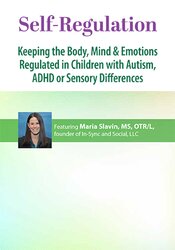
×

Dysregulated kids leave parents, caregivers, and educators frustrated and at a loss for determining next steps.
Meltdowns during transitions. Bedtime refusals. Off-task behaviors. Out-of-proportion emotions.
Kids and their caregivers are coming to you for help. But with multiple underlying causes of dysregulation, it’s hard to know where to begin. And for kids with ASD, ADHD, and SPD, the one-size-fits-all approach simply doesn’t work.
Join Maria Slavin, MS, OTR/L, specialist with over 20 years of experience in working with neurodivergent children, to learn to identify and effectively address the root causes of poor self-regulation and walk away with dozens of evidence-based strategies for creating simple but effective programs in clinical, school, and home settings:
Don’t miss this opportunity! Register today.
All members of the PESI, Inc. planning committee have provided disclosures of financial relationships with ineligible organizations and any relevant non-financial relationships prior to planning content for this activity. None of the committee members had relevant financial relationships with ineligible companies or other potentially biasing relationships to disclose to learners. For speaker disclosures, please see the faculty biography.
Continuing education credit information is coming soon for this live webcast.

Maria Slavin, MS, OTR/L/ has over 20 years of experience as an occupational therapist specializing in the treatment of behavioral health diagnoses such as autism, ADHD, and anxiety disorders.
In 2013, maria founded In-Sync and Social, a private therapy practice, using a combined sensory and behavioral approach to social emotional learning for children and adults. Throughout her career, she has worked in many settings, including pediatric hospitals, public & private schools, early intervention programs, and within leadership of behavioral health organizations. Maria is a trusted clinical and educational consultant both locally in the Philadelphia area and as a speaker at the national level on neuroscience and self-regulation. She has served as an adjunct instructor at University of the Sciences in Philadelphia and Temple University. Her expertise has helped numerous families, professionals, and organizations.
Speaker Disclosures:
Financial: Maria Slavin maintains a private practice and has an employment relationship with Temple University. She receives a speaking honorarium from PESI, Inc. She has no relevant financial relationships with ineligible organizations.
Non-financial: Maria Slavin has no relevant non-financial relationships.
For live CE credit, you must watch the live webcast in its entirety at its scheduled time and complete the CE quiz and evaluation within one week. You will have access for 90 days after the program for review.
Please note: There will be a 70-minute lunch and two 15-minute breaks; one in the morning and one in the afternoon. Lunch and break times will be announced by the speaker and at their discretion. A more detailed schedule is available upon request.
Visit our FAQ page at https://www.pesicanada.ca/faq or contact us at https://www.pesicanada.ca/contact-us.
How Self-Regulation Affects a Child’s Physical, Mental, and Emotional Wellbeing
Sensory Processing Strategies
ADHD & Autism Approaches
Self-Management Strategies
Tying It All Together
Satisfaction Guarantee
Your satisfaction is our goal and our guarantee. Concerns should be addressed to info@pesicanada.com.
Please wait ...